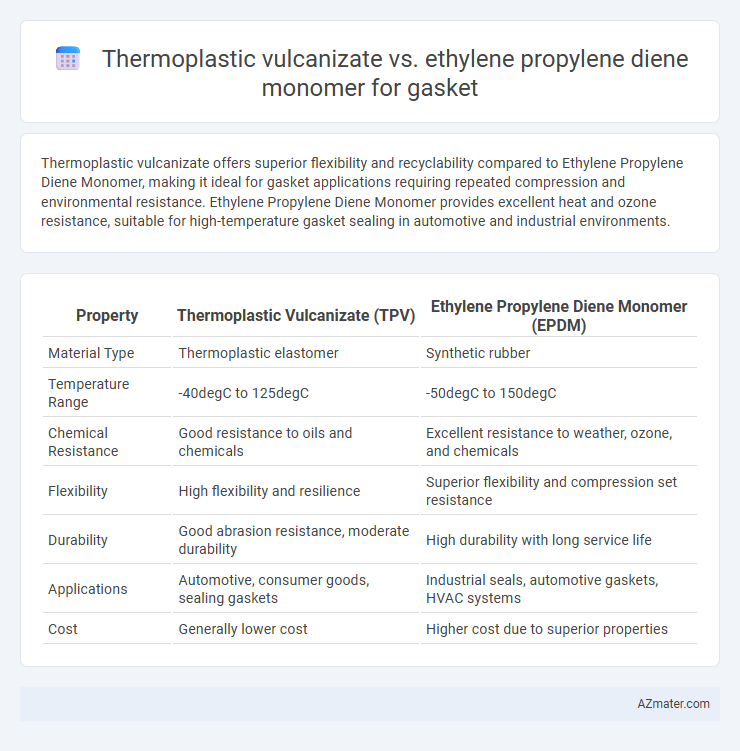Thermoplastic vulcanizate offers superior flexibility and recyclability compared to Ethylene Propylene Diene Monomer, making it ideal for gasket applications requiring repeated compression and environmental resistance. Ethylene Propylene Diene Monomer provides excellent heat and ozone resistance, suitable for high-temperature gasket sealing in automotive and industrial environments.
Table of Comparison
| Property | Thermoplastic Vulcanizate (TPV) | Ethylene Propylene Diene Monomer (EPDM) |
|---|---|---|
| Material Type | Thermoplastic elastomer | Synthetic rubber |
| Temperature Range | -40degC to 125degC | -50degC to 150degC |
| Chemical Resistance | Good resistance to oils and chemicals | Excellent resistance to weather, ozone, and chemicals |
| Flexibility | High flexibility and resilience | Superior flexibility and compression set resistance |
| Durability | Good abrasion resistance, moderate durability | High durability with long service life |
| Applications | Automotive, consumer goods, sealing gaskets | Industrial seals, automotive gaskets, HVAC systems |
| Cost | Generally lower cost | Higher cost due to superior properties |
Introduction to Gasket Materials
Thermoplastic vulcanizates (TPVs) offer excellent flexibility, chemical resistance, and ease of processing, making them ideal for gasket applications requiring durability and temperature resistance. Ethylene propylene diene monomer (EPDM) features superior weathering, ozone, and heat resistance, commonly used in automotive and industrial gaskets exposed to harsh environmental conditions. Both materials exhibit unique performance characteristics that influence gasket longevity, sealing efficiency, and compatibility with various fluids.
Overview of Thermoplastic Vulcanizate (TPV)
Thermoplastic Vulcanizate (TPV) is a high-performance elastomer combining the elasticity of rubber with the processability of thermoplastics, making it ideal for gasket applications requiring flexibility and durability. TPV offers excellent resistance to heat, ozone, and chemical exposure, maintaining its sealing properties under extreme conditions. Compared to Ethylene Propylene Diene Monomer (EPDM), TPVs provide enhanced compression set resistance and faster assembly times due to their thermoplastic nature.
Key Properties of Ethylene Propylene Diene Monomer (EPDM)
Ethylene Propylene Diene Monomer (EPDM) offers exceptional resistance to weathering, ozone, and UV exposure, making it ideal for gaskets exposed to outdoor environments. Its superior flexibility and excellent resistance to heat, steam, and a wide range of chemicals, including acids and alkalis, enhance gasket durability in industrial applications. EPDM's high elasticity and compression set resistance ensure reliable sealing performance under varying temperatures and mechanical stress, outperforming many thermoplastic vulcanizates in harsh conditions.
Mechanical Performance: TPV vs EPDM
Thermoplastic vulcanizate (TPV) offers superior flexibility and compression set resistance compared to Ethylene Propylene Diene Monomer (EPDM), making it ideal for dynamic sealing applications in gaskets. TPV exhibits excellent elongation at break and higher tensile strength, enhancing durability under cyclic loading. EPDM provides robust thermal stability and weather resistance but often falls short in mechanical elasticity and recovery when compared to TPV in gasket performance.
Chemical and Weather Resistance Comparison
Thermoplastic vulcanizate (TPV) offers superior chemical resistance to oils, fuels, and many solvents compared to Ethylene Propylene Diene Monomer (EPDM), which excels in resisting polar substances like acids and alkalis. In terms of weather resistance, EPDM demonstrates exceptional performance against ozone, UV exposure, and extreme temperatures, making it ideal for outdoor gasket applications. TPV provides good weather resistance but may degrade faster than EPDM under prolonged UV and ozone exposure.
Temperature Tolerance for Gasket Applications
Thermoplastic vulcanizate (TPV) typically offers a temperature tolerance range from -60degC to 150degC, making it suitable for moderate-temperature gasket applications requiring flexibility and chemical resistance. Ethylene propylene diene monomer (EPDM) excels in higher thermal environments, maintaining integrity up to 175degC and resisting heat aging and ozone exposure effectively. For gasket applications needing enhanced temperature stability and long-term durability, EPDM often provides superior performance compared to TPV.
Flexibility and Elasticity Analysis
Thermoplastic vulcanizate (TPV) exhibits superior flexibility and elasticity compared to Ethylene Propylene Diene Monomer (EPDM) in gasket applications, enabling enhanced deformation recovery under dynamic stress. TPV's cross-linked rubber phase and thermoplastic matrix provide excellent resilience and repeated compression set resistance, maintaining gasket integrity over extended temperature cycles. EPDM, although highly resistant to weathering and heat, typically shows less rebound flexibility and higher permanent set under continuous strain, limiting its performance in applications requiring frequent flexing.
Cost-Effectiveness and Manufacturing Considerations
Thermoplastic vulcanizate (TPV) offers superior cost-effectiveness compared to Ethylene Propylene Diene Monomer (EPDM) in gasket production due to its recyclability and faster processing times, reducing material waste and labor costs. Manufacturing TPV gaskets benefits from injection molding techniques, allowing high-volume production runs with consistent quality, whereas EPDM requires longer curing cycles and vulcanization, increasing cycle time and energy consumption. The lower tooling costs and enhanced design flexibility of TPV make it a more economical choice for complex gasket shapes, while EPDM remains preferred for applications demanding higher heat resistance and chemical stability despite higher initial expenses.
Sustainability and Environmental Impact
Thermoplastic vulcanizate (TPV) offers superior recyclability compared to Ethylene Propylene Diene Monomer (EPDM), as TPV can be reprocessed multiple times with minimal degradation, reducing landfill waste. EPDM, while durable and resistant to weathering, is a chemically cross-linked elastomer that complicates recycling, often leading to incineration or disposal in landfills. The lower carbon footprint and enhanced lifecycle of TPV gaskets make them a more environmentally sustainable choice in gasket applications where circular economy principles are prioritized.
Best Applications: Choosing Between TPV and EPDM Gaskets
Thermoplastic vulcanizate (TPV) gaskets excel in applications requiring chemical resistance, flexibility, and ease of molding, making them ideal for automotive fluid seals and HVAC systems. Ethylene propylene diene monomer (EPDM) gaskets offer superior resistance to weathering, ozone, and high temperatures, suited for outdoor sealing, roofing, and water-based environments. Selecting between TPV and EPDM depends on environmental exposure, temperature range, and mechanical stress demands specific to the gasket's application.

Infographic: Thermoplastic vulcanizate vs Ethylene propylene diene monomer for Gasket
 azmater.com
azmater.com